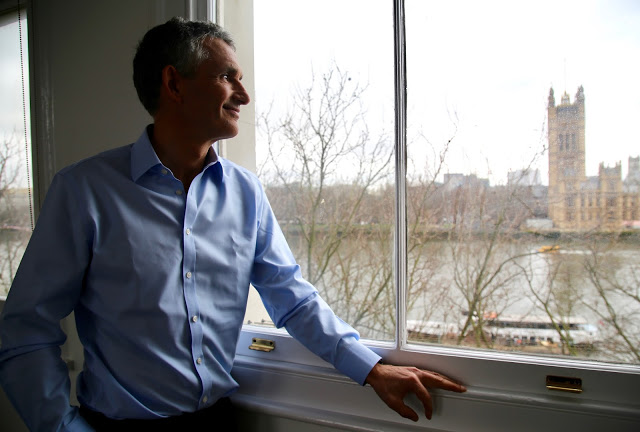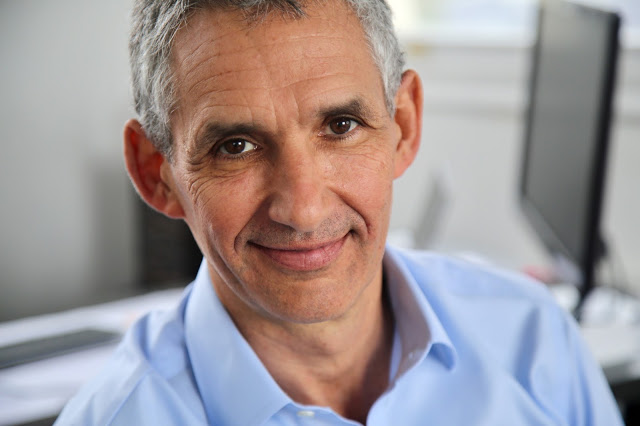One of the most interesting food books that I’ve come across in recent years is ‘The Diet Myth’ by Professor Tim Spector in which he explores the scientific truth behind food myths. My copy is scrawled with notes in every margin.
Earlier this year I went to visit Professor Tim Spector at his turret-like office, windows on three sides overlooking Pimlico and Vauxhall, in the Twins Research department at St. Thomas’ hospital. Tim is in his late 50s, but could easily pass for 45. He’s tall, dark and handsome with a doctors cool detachment. He was brought up in Hampstead but now lives in Highbury, so a North Londoner born and bred.
Me: I’m not a scientist but your book was very easy to read- like a thriller, a microbiome thriller. One of the messages recommended in your book is having a varied diet, having a wide variety of ingredients, varying your routine, varying when you eat, sometimes missing out meals. Would you agree with that?
Tim Spector: Yes absolutely, most of us can relate to getting into ruts.
A recent survey said that 70% of people have the same sandwich every day for at least five years. That’s really depressing. I see myself in that, I got fed up with the same tuna and sweetcorn sandwich. To have the same food all the time, increasingly science is showing that is not healthy. It also stunts your taste buds. In this country we’ve got this massive choice. In the world of internet shopping, some algorithm is always pointing customers back to the same thing. If you shop online, you have your favourites, your specials, which totally kills invention and diversity. It stops you exploring.
I think as well as the science, there’s this big cultural idea, people say we’ve got enormous choice in this country. There are also these other pressures on us to keep us within this rather tight comfort zone. What’s convenient, what we might think is healthy. Most of the population is pretty ignorant about food, GPs are ignorant about food. There really aren’t great sources of information.
KR: GPs are incredibly ignorant about food.
TS: Doctors know the least about it, we as doctors get about 2 hours training on nutrition and are expected to be gurus and advise people. People have given up asking their GPs, are more likely to ask gym trainers or their physios.
KR: Or they will go for Deliciously Ella? Joe Wicks? Clean eating…
TS: Often it’ll be a food guru, who looks slim and sexy, and people will say I wanna be like that and follow their recipes. Sometimes it might be better than just having a tuna sandwich, sometimes it might be more extreme and drive them down another route of religious orthodoxy or fad diets. I can absolutely see why we got into this mess. People have got to realise that we are in this particular state. There are many factors that are driving it. Yes we are surrounded by a huge diversity of things we can eat. Most people eat really boring bad processed food that is increasingly cheap and that’s what’s driving us as well.
KR: About 3 or 4 years ago there was this whole budget eating trend. My personal opinion is that food is too cheap. I believe, in the UK, we spend less of our income as a proportion on food than any other European country. I don’t know how you balance it out, we have such high housing costs and transport costs which is one of the reasons we spend so little on food.
TS: It’s the dream of buying a chicken for 99p, under a pound. We have this amazing pressure, I think it’s cultural, in this country. Having spent a lot of time in France and Spain, where that sort of factor doesn’t drive the average person – they are looking for something good. The idea of having this ridiculously priced animal raised and reared from nothing on a farm that you can sell at a profit for less than a pound. It’s not something we should be endorsing. There’s a small group of the population that realises that but the vast majority of the population are happy to have a 99p chicken, packed with antibiotics, preservatives. All mixed up with processed food which is also very cheap to make because it’s all filled with chemicals.
People feel, if they haven’t had meat, they haven’t had a meal. And so they’ll buy cheap nasty meat. You could spend a pound on good vegetables.
Yes it’s hard to get bad vegetables but easy to get bad meat. The more meat you have on your plate, the less room there is for other healthy stuff. I’m not an anti-meat person, I think meat has a role in our nutrition, but meat should be a treat, not a staple. We should be picking smaller amounts of quality meat. I noticed that when I transitioned my diet, I’m speaking with this holier than thou attitude, but I was absolutely terrible- in my previous lives before I got into this field.
Did you lose a lot of weight?
I lost about 8 kilos. I was never overweight.
You’ve got a naturally healthy good microbiome gut?
It is now. I didn’t unfortunately measure it six or seven years ago. I should have kept a sample in the freezer. I think my family might have objected. I’m happy with my diversity. You measure the quality of diversity in my gut, I’m pretty near the top. I’m sure it wasn’t in that state before, when I was a medical researcher, worked on genes for appetite and obesity and gone through being a consultant in a hospital. I knew more than the average person about health and nutrition. But a lot of the advice that I thought was real turned out to be wrong. It turns out my breakfast which I thought was very healthy..
What did you have for breakfast?
I had some Tropicana orange juice which I thought was marvellously healthy.
(Laughs). At least it wasn’t Sunny D.
(laughs) and muesli. I’d usually get low sugar, I’d mix it with Jordans Crunchy, perhaps a bit of All Bran. I’d use semi-skimmed milk, or soy milk.
That sounds pretty healthy actually.
I’d have some yoghurts, but generally the fruit yoghurts, the cheap ones. It’s not like I had sausages and beans every morning. I’d have a cup of tea because I thought that was better than coffee. It turns out that that everything I ate I’ve completely reversed now.
Now you have coffee?
Black coffee because it’s better for your microbes, it has more polyphenols in it. All the recent epidemiology studies suggest coffee is beneficial unless you have some sort of heart condition, even up to 6 or 8 cups a day. Coffee is up there, next is green tea. Black tea, the way the leaf is processed, it doesn’t give off the same polyphenols. You’ll drink a lot of tea and go to the loo a lot before you get the benefit.
Everyone sensible now knows that orange juice comes from big vats in Florida, it’s about four years old, it has these flavour packs added to it. I think it tastes marvellous, but it’s basically just sugar. You might as well drink a can of coke in the morning. Have the real fruit instead.
The muesli has enormous amounts of carbs in it, added salt and other processed ingredients. I’d just be getting a carb rush. The yoghurt I had, all the extra sugars in it, was giving me large amounts of carbs.
What do you have for breakfast now?
A black coffee, a small shot of kefir, some yoghurt with some nuts or a bit of fruit lying around, sometimes I might have porridge. Generally I have cows milk. I find that works better for me and fills me up. It means if I’m working hard, I can just have an apple for lunch and work through.
You tend to skip lunch?
Yes, when I’m working, not on holiday. It’s harder to skip lunch if I’m at home. There’s a clear psychological element to this. My research shows that leaving space between your meals is beneficial for your gut and health. Sometimes I tried skipping breakfast, having the ‘Italian breakfast’ of espresso and a cigarette but without the cigarette. But generally I like to have something in my stomach in the morning.
All the evidence shows that people who skip breakfast or who have extended fasting regularly during the day, but maintain the same calories, lose weight compared to people who are doing regular grazing which is what we were taught at medical school. Still the government teaches ‘little and often’ rather than gorging, ‘you mustn’t go to bed with a full stomach’ – well tell that to the whole of southern Mediterranean. That’s what they do and they are thinner and healthier than we are.
The one thing I did think about your idea of changing rythyms of eating is that when I lived in France, they have strict routines, they don’t graze. They will have a black coffee for breakfast. They have lunch at midday every single day. When I’ve been in French families, you may get up late, say 11.30 but you’d still have lunch at midday, it’s religious. What do you think about that?
Because they have these regular habits, they know they are going to get lunch so they don’t have a Kit Kat at 11am, they don’t graze, they don’t have crisps, they don’t have cheap chocolate, they don’t have tea time.
We are having essentially having five meals a day. They are having generally three meals but I think about a third of French people completely skip breakfast.
Having been pregnant in France, a lot of French people have worms. When you are pregnant in France, you have a monthly blood test to see if you have worms. In the end I had to say to the doctors: look, I don’t eat meat and I don’t have a cat. But I wonder if that helps?
Maybe, it probably helps their immune system. The French – their rates of obesity are increasing like ours but just from a lower base.
Comparing all these – we are looking at the traditional foods of Spain, Italy, France, not what the young people are eating now.
Other rules they have- you wouldn’t have a tv dinner in france. It’s impossible. You sit, you focus on your food, you are not being distracted. Generally they have three courses, even if they are small, they will have a soup or crudité, means that you get a built-in diversity rather than one big plate with bangers and mash or spag bol.
L’assiette anglaise… everything piled on a plate at once.
Yes, eaten in a rush so you can get back and watch the telly. That’s sadly what’s happening here.
We are always focussing on calories and fat and sugar and ignoring food patterns, how long people fast overnight. This idea of grazing versus feasting, we’ve completely got that wrong. The people who tell us what to eat have completely got it wrong. The science is all showing the opposite. The government website at the moment, with their ‘eating plate’, it says ‘never skip meals’, particularly breakfast, ‘breakfast is the most important meal of the day’. Well that was a promotional exercise in the 1950s to try and get people to eat eggs. The evidence from six randomised trials show that the opposite is true. I’m not telling everyone to skip breakfast because personally I like breakfast.
What about school children?
Again there’s not been many studies of school children. The fear is that little Johnny won’t be able to work.
Yes because the ‘literacy hour’ is between 9 and 10am – that’s when they learn the most.
That was always the big fear, mothers must get food down their children. We need more studies. The studies have not so far shown major effects-when they’ve done randomised studies.
When they’ve done bad studies, the kids who do badly skip breakfast, but I think they are getting cause and effect mixed up. There are some kids who really aren’t hungry at breakfast and that’s their natural rhythm and you shouldn’t worry about it. Others are not hungry in the evenings.
We are all different. You just need to listen to your own body and not worry about it. We’ve had millions of years of evolution, for our bodies to tell us when we are hungry. I think to ignore that because of a 1950s publicity campaign and a few psychologists who are scare-mongering would be wrong.
I don’t want to give rules for everybody because there might be kids with major problems who need breakfast. In general, let’s be open about this and listen to individuals, there isn’t one rule fits all.
I found your chapter on poison interesting, but you are very dismissive of homeopathy which I’ve found does work, particularly on children. It does seem to work on some sort of quantum physics level.
A little bit of poison is helpful is your theory. Do you disagree with homeopathy because the amounts are just too tiny?
Yes. It’s never been proven to work. Scientifically the amounts of the dilutions just don’t make any scientific sense. You can never rule anything out, it would be too arrogant to say we know everything.
What I meant in the book by ‘a little bit of poison doing you good’ is more, was maybe once a year having a fry up or a Macdonalds to test your system. If you have a pure diet, it’s not good for you either.
Same idea as a little bit of stress is good for you because it’s testing the body. Infections test the body.
With homeopathy, the levels of dilution, you’ve got Lake Windermere and some kid pees in it, and I’m at the other end of the lake, that’s going to have a dramatic effect on my water – drink magic water? So that’s why I don’t believe it.
Are you married with children?
Yes.
So you never used homeopathy on your kids?
My mum was a big believer in homeopathy…
… so she gave it to you?
… and always used it on me. Yes, the placebo effect is very important for lots of diseases.
I know the anecdotes about how it works on animals, but one shouldn’t be fooled by this.
I tried to base my book on science not on old wives tales. I dismiss as many mainstream medical ideas as well as alternative things.
So you are equally cynical about everything!
(Laughs) Including myself! I discuss my own errors that I’ve made during my scientific career as well.

What advice would you give food writers and chefs, about what to add to their menus?
The cookery world really needs to embrace the fact that they are not just cooking for the person eating the food but the trillions of other beings that are waiting for it down the other end as well. Change that mindset.
Say: ‘what can we change in this menu, to make it more healthy or gut friendly?’
Push people to try something new. We are quite conservative about buying things. I’ve heard people talking about Jerusalem artichokes: ‘oh well where am I going to get these from? Why can’t I use just potatoes?’. It’s the job of food writers to stimulate people to try new things, have variety, have something different.
Maybe it’s the fartichoke element? Is wind good for your system?
A little bit. Not in a lift. (laughs).
In the department we put ten people on a very high fibre diet. We’ve got a high fibre nutrition biome we are trying. In the first few days everybody noticed- well we literally doubled the amount of fibre, so we have about 18 to 20 g of fibre.
Is that a lot?
Extra! The UK average is we normally eat about 20g of fibre a day.
If you eat 500g of Jerusalem artichokes, how much fibre is that?
I can’t do that off the top of my head. If you ate a bag of Jerusalem artichokes you’d certainly fulfil your fibre needs. In the first 4 days, you will undergo changes, that is because your microbes, particularly the ones that like fibre, are fermenting the food, and you will get wind.
It turns out as you continue, that gets less and less, and you get used to it. Everyone says ‘oh we can’t have that it’ll give me wind’. That’s where we need to introduce these things slowly and realise that your body gets used to it. Like the first time you have a curry or the first time a teenager has a beer. Your body gets used to it and has to adapt.
If cookery writers, say, want to move someone from using yoghurt which most people are comfortable with – which is the case now but it wasn’t always the case. Thirty years ago with natural yoghurt people would say ‘oh how can you have that without sugar…’
Whereas in France they have huge packs of individual plain yoghurts which we can’t get here.
Yes we are behind where they were. These types of milky sour products -most of Europe has those tastes. In Scandinavia sour milk is part of their remit. Some people need to introduce just plain yoghurt without plastic fruit in it or artificial sweeteners, and others need to transition from yoghurt to kefir for example. That’s an acquired taste as well. The first time you taste kefir, it’s like woah. If you haven’t got that palate, it’s like drinking fine wines and you start to feel the nuances of it.
The food writers have got to train people to do it. It isn’t yes, no, or I love it. You’ve got to try a little bit of it.
At restaurants you can’t buy a glass of kefir can you? They are not serving that variety of drinks.
No. I was speaking with the owner of Leon restaurants…
Henry Dimbleby?
Yes Henry and John Vincent, they’ve started selling kefir shots. They mix it with blueberries.
To get people to try it?
Yes. Even then some people think: it looks like a nice sugary smoothie but it’s got a tart taste. Converting people quickly to this is a slow business, it needs everybody to start doing this together. You are not going to like this the first time. Start with it as a medicine and after a while you actually start to like it. We didn’t have it as kids, like many cultures do. This is true for many of the fermented foods. First time I tried kimchi, it’s a bit weird. I didn’t like it.
It shouldn’t be a like/dislike thing, we should start slowly, getting used to it, teaching everyone.
How does that work with being a locavore and food miles? In order to have enough variety, how many ingredients do you need to eat in a week? That means importing food as well?
That is a dilemma. If we are going to have a variety of ingredients we need to start importing them. If you are going to have 30 ingredients a week which is reasonable. If you are changing diet, you’d want more than that. Most people in the UK have about 30 ingredients a year.
Really? 30 ingredients in a year. Really?
Yup. There’s a big range: people who have just processed foods, eat about 10. People like yourself, gourmets, may have a hundred but we are never going to get as high as the hunters-gatherers who have 600 a year.
Really? Because they are trying different berries and nuts?
Different species of bird, lizard… That’s where we came from.
Your point is… there’s me with my yoghurt, on which I sprinkle some chia seeds for example, say from South America. I’d rather have something local. You can’t tackle everything at once. If you increase the demand/the scale for this stuff, you can get locally sourced. I’m sure the south of Spain could start growing this stuff.
I often meet suppliers and producers and I’ve found them remarkably resistant. For instance tomatillos, do you know them? They are like green husk tomatoes, they make wonderful salsa. I went to see one large UK tomato grower and asked ‘Can you grow some tomatillos?’ Their head gardener said ‘oh no it’s too hard’. But I grow them in my garden in Kilburn, it’s easy, they even grow in the winter. But they just want to grow the same stuff. That’s a problem.
Take tomatoes, the one thing you notice in Spain or when you go to other countries, every shop has about six different types of tomato, all for a different purpose. You go to Sainsbury’s and you’ve got the same ones, big or small ones injected with sugar. Or they’ve got no taste but they look perfect, perfectly round. In some of these other countries the tomatoes look horrible sometimes…the Spanish ones I particularly like on say, Pan con Tomate, are often half green.
Supermarkets have got obsessed with this. If they said ‘this is what’s natural’.
When I went to see farmers in South Africa who were growing grapefruit, if there was a slight defect, say a slight nipple on it where it joins the branch, the supermarkets would reject it. I don’t understand it. I don’t think people are that conservative about the shape of their fruit.
The supermarkets have a massive role to play. They are so driven by this obsession with uniformity. There’s definitely a backlash. People are avoiding supermarkets where I live. People go to their local shops now.
Where do you live?
I live in Islington. Fifty percent of the residents don’t own a car, it’s one of the lowest car owning places. So once that happens, you shop locally. They are now thriving, the local fish shop, the cheese shop…
When I lived in Paris, that’s how I shopped, a little bit every day.
No one in Spain buys more than two days shopping. You shop on your way home from work, the shops are open till 9pm. You buy everything fresh and you cook it. If you can’t carry it, maybe once every 3 months, you might do a big order.
I think people would like to shop like that.
Obviously Islington is..
… not the rest of the country.
I had a friend of mine in Liverpool where you can’t buy Vogels bread. She said ‘This is amazing stuff, but you can’t buy it in the supermarket in Liverpool.’ What happens in London doesn’t happen elsewhere.
Even in London, the same chain, just two miles apart, will sell different things.
The good thing in London is that poorer areas tend to have more immigrants. Therefore more corner shops with a large variety.
I note that you wrote some recipes for the Guardian.
You don’t have to be worried though. (Laughs).
How did you find that?
I was asked to do some recipes. Adaptations of recipes that could be tweaked to benefit your gut microbiome. It was fun.
Did you find it difficult, did you know how to write a recipe? I had to learn when writing my first cookbook.
A bit of trial and error. Things like measurements, how specific do you have to be? I just did it rather instinctively. I needed some help.
Also putting ingredients in order of use rather than the most important ingredient in the dish at the top. Once you know how to write a recipe, it becomes easier to follow recipes as well.
Yes I see that yes. And I try not to do the Ottolenghi sort of thing where you have to spend two weeks shopping in Morocco.
Although he’s got that variety.
Definitely, he’s top for variety!
I’m a complete ingredients freak. Cookbook writers influence supermarket buyers. In my first book I talk about ingredients that then, you could not find. But now you can find them. In this latest book V is for Vegan I talk about nutritional yeast which hasn’t quite gone mainstream yet. It’s a bit like Brewers Yeast, it’s got that real cheesy taste to it, you mix it with nuts, a bit of salt, you’ve got vegan parmesan. I’m not a vegan but I accepted the challenge to write it because I thought this is going to stretch me and make me discover new things.
If someone told me that you are going to eat tofu for the rest of your life, I’d rather slit my throat. My view of English tofu was so bad. But when I went to Japan last month, it was unbelievable, not the same thing at all. The home made tofu that I used to have in these small hotels is amazing… savoury… all the whole range. Of course they are embracing everything now. They’ve got their old stuff, but in North of Japan they’ve got cheeses.
What were they like?
Plain, they were trying to copy the European ones. They used good ingredients.
I’ve tried Japanese wine, it’s similar , it’s not got there yet. But they will, they are very smart people.
They have a hugely diverse gut. Amazing group to follow what they eat. You can’t beat the Japanese breakfast.
What is it? Noodles and things?…
You have a buffet which has at least 60 different items.You get a tray, like a bento box, with little squares on it that you put your different pickled vegetables in, your smoked fish, your tofu, your miso soup, your seaweed, your little bit of egg. Oh it’s amazing. Anyone who’s interested in diversity, go to Japan! Here you don’t see that variety in Japanese restaurants, just sushi and soup.
And tempura. Which was Portuguese originally.
They have two completely different meals every day.
Have you tested Japanese microbiomes? Have you had any Japanese twins?
We don’t. There’s more work on Koreans. They have much healthier, diverse microbes than we do. Japanese have microbes that we don’t have because of seafood and seaweed. They’ve got microbes that specifically digest the seaweed. We eat seaweed, but we probably not going to be getting the same benefits. If we eat more of it, we will start developing the microbes. That’s the theory.
It shows you can change your diet, your food, and your microbes will catch on. They need to survive evolution wise as well. The only thing they can’t deal with are artificial sweeteners… chemicals.
It’s just too synthetic.
I’ve just done a maple syrup supper club. People say that the body digests all sugar as sugar. But maple is such an interesting ingredient. When I visited Canada to see a maple syrup farm, it’s incredible. When it comes out it tastes like water and then it’s boiled down.
Any thoughts on that?
They haven’t been huge amounts of scientific studies but it suggests the body reacts the same way. But if there are any benefits of say, maple syrup, it’s because of something else in there…
Tree blood?
yes, bits of bark or other minerals.
The idea that brown sugar is good for you and white sugar wasn’t, I think has been disproven. Sugar just gets absorbed generally very early on in the gut. It doesn’t usually hit the microbes, they don’t benefit.
It doesn’t even get there?
At the moment sugar is totally demonised. I wonder if it’s going to switch around, in 5 years time or 10 years time when some new science comes along. Obviously eating too much sugar is a bad thing. But to me, it’s a plant like everything else.
The danger of this ‘sugar is evil’ is you’ve got these again, I see food fads as just like religions- blind faith. There’s liberals, there’s extremes and orthodox ones that cut your hands off if you ever look at a can of Fanta. You are right. The problem with sugar is people cut out every carbohydrate. There is a spectrum from the totally evil can of Tango to …
… sucking on a stick of raw sugar cane… could that be bad?
or kale? which is a sugar but it’s a complex sugar. So people aren’t aware of the gradation between this. Sugar – does that mean bread? so bread is carbohydrate but if you stop that then you’ve thrown out a big source of fibre. Sugars are basically a source of fibre, in a carbohydrate sense.
So don’t throw the baby out with the bathwater when you have these ridiculous rules. Yes we all need less refined sugar, but if you cut out processed foods, you don’t really have to worry about it. I’m against cutting out any one thing. You need all the food groups.
If you’ve got the variety, you’ll have no space for all that refined sugar. If you want to have half a spoon of sugar in your expresso, every now again, that’s fine. If you want to have a creme caramel as a treat, that’s fine. If you’ve got a good microbiome as a base then you’ll be fine, if you haven’t got a decent high fibre base diet, that’s when you have a problem.
Talking about sugar… lets talk about diabetes, which is a huge problem right now. Should diabetics be eating inulin rich foods?
Inulin is one particular type of fibre which studies show that microbes love it. There is not enough research yet on how we separate all the different sugars that get broken down, sugars from complex plants. But all diabetics would benefit from a greater diversity of foods, more plants, more real food. The controversy of diabetes is whether you should be obsessed with blood sugar level or take a more holistic approach. There’s two ways of curing diabetes. One is to go on a protracted 800 calorie diet.
The Newcastle diet?
Yes. And only about 1 in 10 people can do that. The people that have that willpower and motivation. Reverse their diabetes. The other is to have bariatric surgery.
Which there are a lot of problems with?
Not really. That’s a myth. It’s one of the safest operations. You are in and out within about two days. Within 10 years about 80% of people have kept off the weight, it’s 25% less than it was. And the diabetes is cured within two days. So the reason bariatric surgery works is because it’s a microbial transplant from one part of the gut to another. It’s nothing to do really with any effect on the pancreas. Suddenly your metabolism, which is really rotten and very hard to shift, people with diabetes and obesity, it’s really hard to shake that out of itself. Obviously these are radical things, it’s surgery and there are side effects. I think it’s telling us a lot that those are the only two things that work. The drugs don’t work.
Is there a microbiome non-surgical method of curing or lessening diabetes?
Fecal transplant. Poo transplant. So far there is only 1 study done on 10 people and you did get a reduction in blood sugar from having a transplant from a healthy donor. We need much longer term studies, you probably need to have it once every six months to get a good result.
There is increasing evidence that you can personalise your diet. You can look at your microbes. In an Israeli study they gave people all these different foods, they kept a diary, and checked their blood glucose every hour for weeks and worked out what determines your blood sugar peak is nothing to do with the GI of your food. So some people can have lots of potatoes in their diet with no ill effect and others will be affected by say sushi. That sushi with a little bit of rice on it will give them that blood sugar spike. Even some people can eat ice cream without problems. So increasingly I think that’s where the future is going to lie. It’s one way of controlling diabetes, it won’t cure it. But clearly the link between our diet and our microbes is important. Over the next five years that’s what we are going to be working on, academic programmes on nutrition in general. Pro-biotic foods are going to be really big business. We will be testing before and after diets. What are the microbes that keep people lean?
Thanks Tim. Would you be interested in doing a supper club with me?
Chat about the food ?
Yes and help me construct the menu.
A microbiome menu. That’d be fun.

If you want to come to the Microbiome Supper Club with Professor Tim Spector, please book tickets here.
Event is on the 9th of September 2017, starting at 7.30pm.
Tickets are £45.
Professor Tim Spector’s books will be for sale (and mine).
That Gut Feeling on Radio 4’s The Food Programme with Professor Tim Spector. Part One. Part Two.





Such a great read! Thanks for sharing Kerstin!
Thank you. Listened to both of the pod casts. Very informative.
Love this stuff, great common sense and Full facts – have borrowed the book from the library. Shame I can't attend the Underground meal as already booked 🙁
Fascinating! Can't wait to find out more. Thank you.